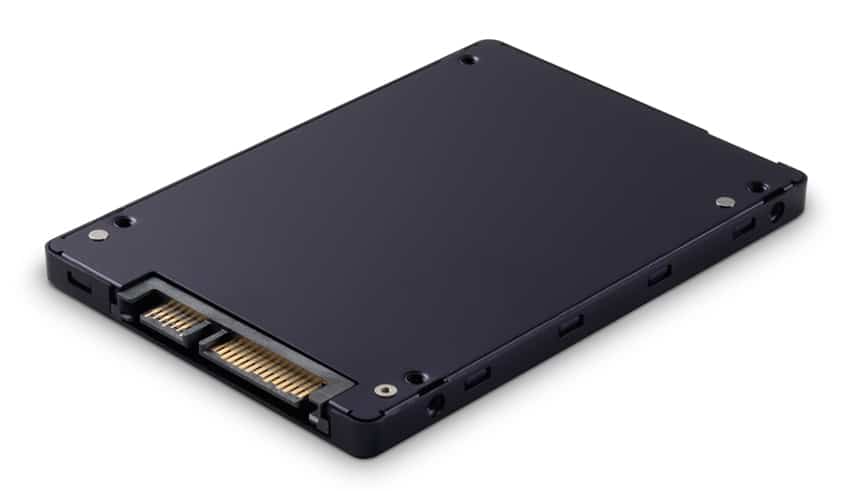Today Micron Technology, Inc. introduced its new enterprise SATA SSD family, the Micron 5100 family. The 5100 family comes in three models for varying needs of data centers and comes with a maximum capacity of 8TB, the highest capacity for a SATA SSD currently available. Micron is positioning its new family of drives to act as a bridge for organizations as they transition to all-flash data center.

The price of SSDs is going down and the capacities of the drives are growing much faster than their HDD counterparts. SSDs are no longer being considered just for accelerating certain applications or workloads. They are now being considered as complete replacements of HDDs in the data center, bring higher performance, lower energy consumption, and higher reliability to all workloads. Micron is throwing its hat into the ring on the all-flash data center with its new 5100 SSD family.
With the 5100 family of SSDs, Micron is bringing to market drives that have a better quality of service (99% better QoS than HDDs), the highest SATA SSD capacity currently available at 8TB, high-performance, and a better TCO. The drives use Micron’s 3D NAND technology and come in three different models allowing customers to choose the model best suited for their needs, or different models in the same data center for varying needs. The three models include the Micron 5100 ECO designed for cloud services, Micron 5100 PRO for performance, and Micron 5100 MAX for write specific workloads.
5100 family specifications
5100 ECO
- Form Factor: 2.5”, 7mm, M.2
- Interface: SATA 6Gb/s
- NAND: Micron 3D eTLC
- Capacity
- 2.5”: 480GB, 960GB, 1920GB, 3840GB, 7680GB
- M.2: 480GB, 960GB, 1920GB
- Endurance
- DWPD: <1
- TBW: 0.45-8.4PB
- MTTF: 2 M hours
- Performance
- Sequential read performance (128K): 540MB/s
- Sequential write performance (128K): 380-520MB/s
- 4k random read performance: 93K IOPS
- 4k random write performance: 9-31K IOPS
- Use cases: Read-sensitive cloud services and content-sharing applications
5100 PRO
- Form Factor: 2.5”, 7mm, M.2
- Interface: SATA 6Gb/s
- NAND: Micron 3D eTLC
- Capacity
- 2.5”: 240GB, 480GB, 960GB, 1920GB, 3840GB
- M.2: 240GB, 480GB, 960GB, 1920GB
- Endurance
- DWPD: 1-3
- TBW: 0.65-17.6PB
- MTTF: 2 M hours
- Performance
- Sequential read performance (128K): 540MB/s
- Sequential write performance (128K): 250-520MB/s
- 4k random read performance: 78-93K IOPS
- 4k random write performance: 26-43K IOPS
- Use cases: Mixed use, latency-sensitive applications
5100 MAX
- Form Factor: 2.5”, 7mm
- Interface: SATA 6Gb/s
- NAND: Micron 3D eTLC
- Capacity: 240GB, 480GB, 960GB, 1920GB
- Endurance
- DWPD: 5
- TBW: 2.2-17.6PB
- MTTF: 2 M hours
- Performance
- Sequential read performance (128K): 540MB/s
- Sequential write performance (128K): 310-520MB/s
- 4k random read performance: 93K IOPS
- 4k random write performance: 48-74K IOPS
- Use cases: Data-intensive, high-volume applications
For those that are curious, all of the 5100 line has some level of overprovisioning. Each model has different percentages of overprovisioning. According to Micron, Lower density solutions require added overprovisioning percentage to overcome performance due to die size; higher density solutions require added overprovisioning percentage due to the proprietary firmware algorithms used to reach above the Controller limitation on NAND management gating other solutions. The ECO ranges from 10-20% overprovisioning, the PRO ranges from 20-50% overprovisioning, and the MAX ranges from 60-80% overprovisioning.
Huge capacities and faster speeds only take drives so far in a data center. The drives also need to have good management and optimization tools in order to take full advantage of their capabilities. Micron has introduced its new FlexPro firmware architecture that enables admins to tune specific features of the drives such as capacity, security, endurance, power, data layout, data cleanup, and performance. The 5100 family will be the first to feature this new firmware architecture.
Pricing
Though all pricing is subject to volume and engagement, rough pricing is as follows:
- ECO: $0.55/GB to $0.45/GB
- PRO: $0.65/GB to $0.55/GB
- MAX: $0.75/GB to $0.65/GB




 Amazon
Amazon